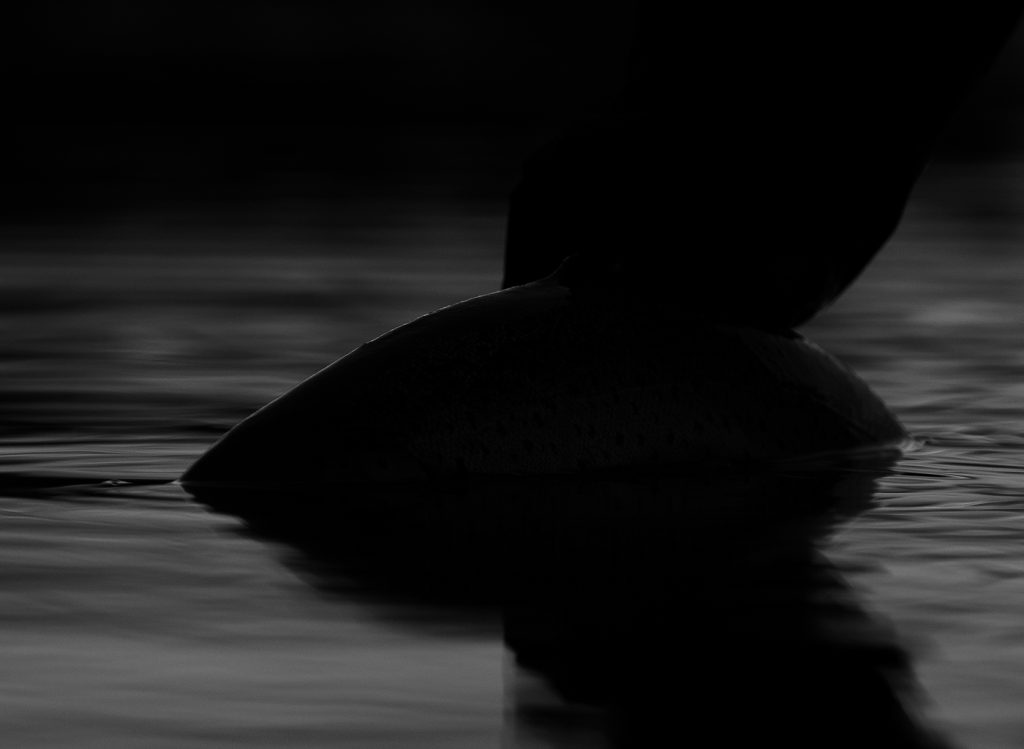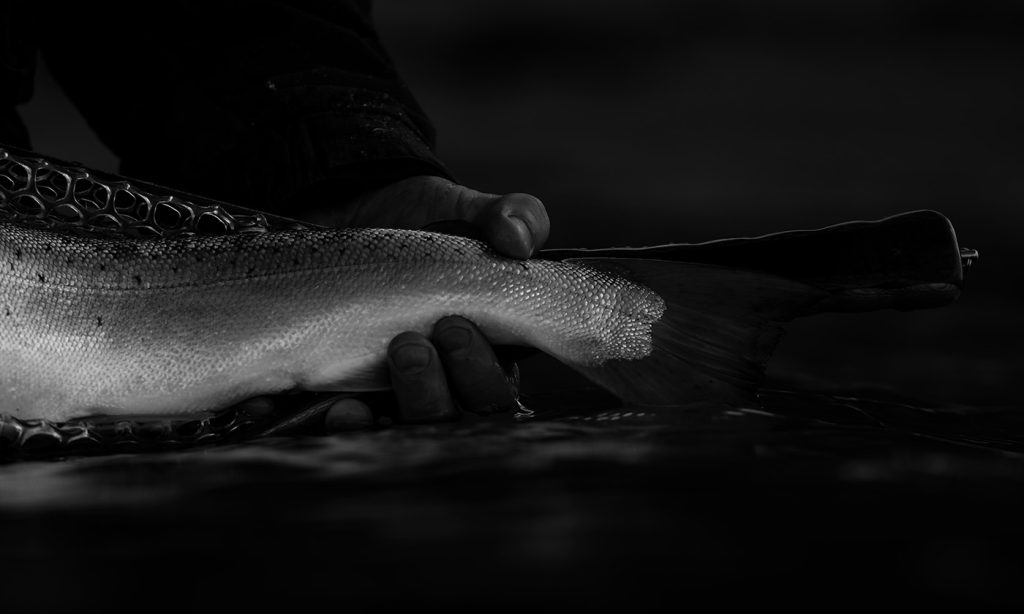
The question is not how to fish, but why you do it. The author and his fishing buddies do it out of necessity. It’s more important than life and death to them to escape the human world, step in to water and wave a stick. Left on the shore is their misery and worries. Standing in the water they find freedom, healing and occasionally a fish.
Battles are lost and won with tongue in cheek and always celebrated with mountains of cake and an endless stream of fresh espresso coffee. To the band of brothers it’s more important who you fish with than how big the fish is; except for the ones lost.
You may not learn a lot about catching more and bigger fish, but reading these stories is like holding a mirror up in front of yourself getting a little wiser. The small why is a big one.
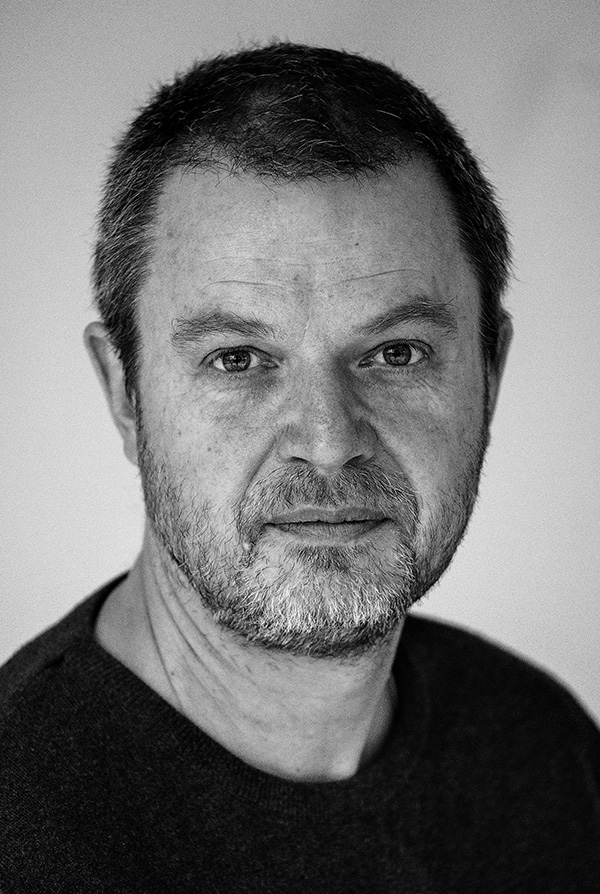
- This artickel is written by Danish photojournalist Søren Skarby
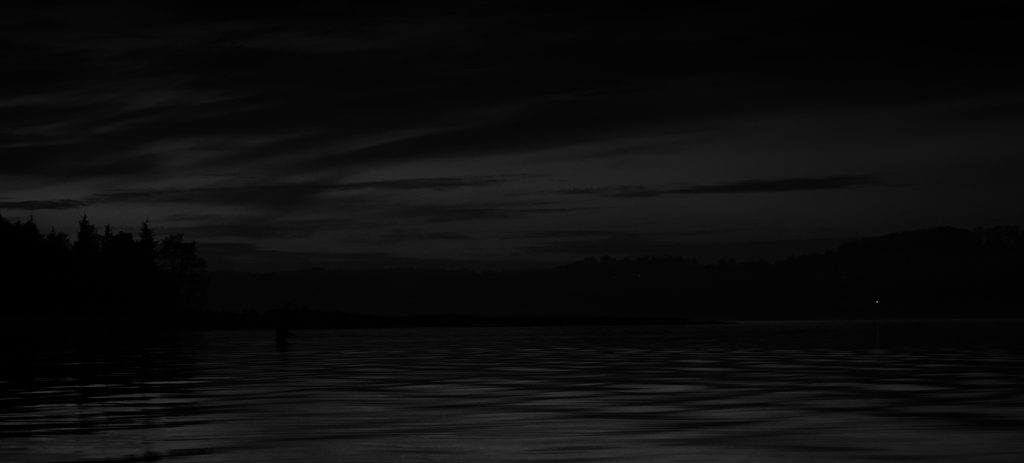
I’m walking behind my fishing buddies when the thought suddenly hits me: “We are a mess, a platoon of misery.” The name of the place is very fitting, translated from my native tongue into English, “The last line of defence” and we are going to defend it.
Just in front of me is the bricklayer. He’s been shovelling concrete, loading bricks and climbing ladders for more than 35 years. It’s always a wonder to me how he is able to just lift a fishing rod after a day’s work. Sometimes he has been moving more than four tons of concrete.
He doesn’t complain, but you know for sure that when we return to the cars after a night in the water, he will swear when he steps out of his waders, his feet and legs always spasm.
A little further up the path is the math teacher. From the outside he looks fit, but I know that the biceps in his left arm isn’t what it used to be. A rugby match with some of his pupils tore it apart. His double haul still works and his casting have got such elegant curves that it brings tears to your eyes.
We pass a corner of the coastline and get the first view over the beach. The wind has dropped to a whisper. Within less than an hour the tide will be eastbound. All the small telltale signs are there. A perfect night is being born right in front of our eyes.
Up in front is the youngster. He’s not even half the age of the rest of us. Born with bad hips he started walking in a way that went straight in to his spine and made one of the disks slip. The hips are fixed as well as doctors can fix hips. Not perfect, but they work. You can’t say the same about the slipped disk.
On the beach he is always trying to straighten his aching spine; it looks like yoga in waders. The youngster used to have more than physical trouble. The tight net of tattoos on his arms all the way out on the back of his hands tells a story we don’t really know and don’t ask about. What we know is that fishing took him away from his former path in life, and that to a nearly extreme extent. As the only one of us, he swings a rod almost every day. The result is an endless stream of pictures of sea trout. Sometimes it can be a bit over the edge, but we let it go. After all he is the youngster.
We drop down on the beach… and unload our bags. Each and every one of us has got his own personal spot to sit. The last one to arrive is the Humpback Whale. The reason why he was given the name is pretty obvious. Three slipped disks and arthritis in the spine make him walk with his upper body in an angle of nearly 30 degrees forward.
His gear is always loaded in small bags to distribute weight. They all land in the last vacant spot. He will be the last one in the water too; he is so far-sighted that it takes him forever to rig his rod. As the whale he is, he wades deeper than the rest of us because the water supports his aching back, but it has always made me worry. The tidal current can be pretty strong here. Up to 3 or four knots, respect is recommended.
It’s not an easy task to walk with stiff limbs. One night he tripped in the water and ended lying with just his nose above water unable to get up. The fly he was fishing with got stuck in his finger. Every time he tried to stand using the rod as support the hook dug deeper in. The youngster cut the line and I helped the drowning whale to safety. On the beach he asked for a pair of pliers and pulled the hook out; not a sound passed his lips. I thought of his stories about growing up in Greenland; toughness comes from somewhere. We were all a bit upset drank a coke and talked too loud about almost everything. Then the humpback whale showed the kind of very dry humour we love him for. “I didn’t catch anything, but I enjoyed the miracle of nature.” The roar of laughter woke up the sleeping birds.

It’s still not time for fishing. We lie down in the evening sun and talk quietly. It’s all fishermen’s talk. Which fly to use. Which fly worked at the same time last year? Will the current be strong? Nobody knows. The Baltic Sea is like a giant bathtub. Yes, the tide is changing every six hours, but the power of the current is depending on the wind. It can stack the water in one end of the sea. When the wind loosens it’s grip the water comes tumbling back.
I make fresh coffee and my buddies join me for a cup. Some of them pass some rolled weed around, their medicine. It has never been my poison and alcohol is totally out of the question. First of all wading, strong current and night is a bad combo together with alcohol. Second you have to pull your waders down too often. We stick to coffee.
And me, the last member of the platoon? I knew you would ask. Many years of carrying heavy camera gear and sitting in front of a computer fighting the worlds most dangerous animal the computer mouse have taken their toll. The muscles in my shoulders and neck sometimes get so stuck that it sends me horizontal on the couch for the most of a day, a headache from hell. The camera has brought me to places where things for sure aren’t as calm as here. Walking in minefields, being shot at and by far too many dead kids can still wake me up at night. I have taken pictures I won’t show to anybody. Waving a stick makes both my body and soul loosen up. That’s my medicine.
The last ferry of the day is leaving the harbour on the other side of the narrow channel. It’s less than 500 meters wide. The weird thing is that the current bounces like a bullet in a concrete cellar. Running eastward, as it’s beginning to do now, will send it right in front of our feet. When it’s west bound we can only see it far out. The sun has disappeared between two church towers in the town on the other bank. It’s time.
All the wounded soldiers pick up their rods and enter the water. The current is strong tonight. We often joke about (the fact) that we don’t need to go to the gym. It takes a whole lot of effort to walk here. I end up at my usual spot on a bank of clams. In front of me is a salty river. Sometimes I can loose myself just starring at the moving water. When I look down shrimps are being flushed through at high speed. You can almost see the panic in their eyes. The trout knows that dinner is served, but safety measures make them wait for the dark.
I dip my shrimp fly for the first time. It’s like fishing salmon in a river. Cast a bit up against the current and let the fly swing around while stripping it. There’s no need to move up and down the coast; the fish will come to you.
It’s nearly dark now and we can hear the first splashes far out. Hunting trout are closing in. I tie the leader off and fasten three feet of tippet directly to the fly line. The fly is changed to a floating shrimp or to be more precise: it’s hanging like an emerger in the surface.
This is one of the funniest ways to fly fish in saltwater. When you see a trout make a shrimp disappear in front of you, the boil is unmistakable, cast a little upstream and let the fly float over the spot. The take is like a hammer and often the fish explodes into the air hooking itself. There’s always light on the harbour on the opposite bank. A trout hanging in silhouette can take your breath away.
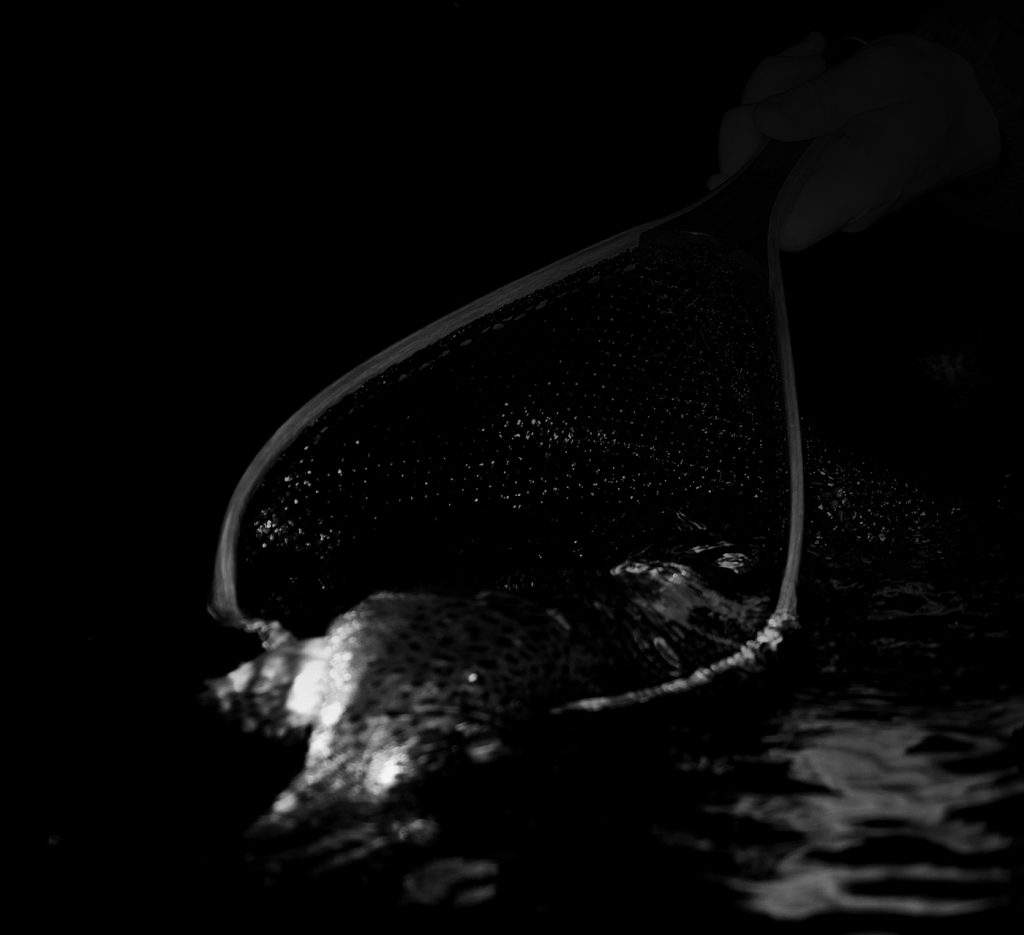
The youngster is the first to catch a fish, no surprises there. 18 inches of the finest silver as they all are on this time of the year. After a short photo session it’s back in the right element. He catches so many that he only keeps those that are bleeding from being hooked in the gills.
A boil in front of me makes me cast. The fly disappears, not in a splash, but with different sound, like a round stone landing vertically in water. Cod! Those greedy little bastards; it has almost swallowed the fly. It happens that I catch a good cod for the pan, but most of them are this size, all mouth and no brain. Some years ago the math teacher and I caught more than 50 of them in one night; he caught the only trout.
Next splash is for sure a trout and not a small one. It makes all loose line disappear out of my hand and far out it jumps high in the summer night. We end up dancing. Or rather: I turn and it circles around me before it ends in the landing net. What a fish and for sure a keeper, more than 20 inches and nearly totally silver. The belly has begun turning yellow because of the steady diet of shrimp. Platoon halt! It’s time to celebrate.
The bricklayer is always hungry. He can’t see saltwater without reaching for his lunchbox. Not even on short fishing trips. Now he drags a box full of Danish pastry out of his bag. He lives close to the best bakery in town. The kick of sugar will keep us fishing for some more hours. My job is to bring the coffee gear. I get it to work and hand out mugs.
There’s no wind at all. The water looks like a newly polished floor. The only sound is the seagulls that always argue, distant music from a bar on the harbour and my buddies’ low voices.
We talk about the world, fishing and life. There is no need for a therapist here; this is much better. We are a mess, a platoon of misery, an army of disabled, but we can still fish.
